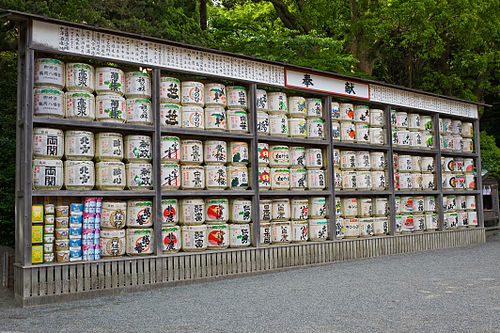Sakenoun
cause, interest or account
Sakenoun
purpose or end; reason
Sakenoun
the benefit or regard of someone or something
Sakenoun
contention, strife; guilt, sin, accusation or charge
Sakenoun
A class of Japanese rice wines made from polished rice and typically about 20% alcohol by volume.
Sakenoun
(inexact) rice wine.
Sakenoun
Final cause; end; purpose of obtaining; cause; motive; reason; interest; concern; account; regard or respect; - used chiefly in such phrases as, for the sake of, for his sake, for man's sake, for mercy's sake, and the like; as, to commit crime for the sake of gain; to go abroad for the sake of one's health.
Sakenoun
a traditional alcoholic drink of Japan. It is made from rice.
Sakenoun
a reason for wanting something done;
Sakenoun
Japanese alcoholic beverage made from fermented rice; usually served hot
Sakenoun
the purpose of achieving or obtaining;
Sake
Sake, also spelled saké ( SAH-kee, SAK-ay, also referred to as Japanese rice wine), is an alcoholic beverage made by fermenting rice that has been polished to remove the bran. Despite the name Japanese rice wine, sake, and indeed any East Asian rice wine (such as huangjiu and cheongju), is produced by a brewing process more akin to that of beer, where starch is converted into sugars which ferment into alcohol, whereas in wine, alcohol is produced by fermenting sugar that is naturally present in fruit, typically grapes.
Shochunoun
A Japanese alcoholic beverage, most commonly distilled from barley, sweet potato or rice. Typically it is 25% alcohol by volume, making it weaker than whisky, but stronger than wine and sake.

























